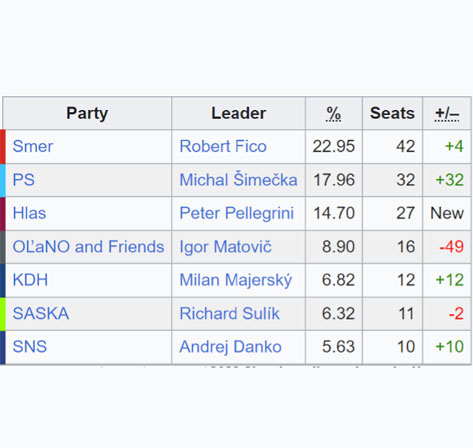October 2023
Election Update: Slovakia Parliamentary Elections
Region: Europe
Author: Erin McCoy & Marie-Sixte Imbert
As the leader of SMER, Fico will have the first opportunity to form a coalition government and secure partners, as his party needed a bigger share of the vote to govern on its own.
On September 30, Slovakia held parliamentary elections to elect its fifth prime minister in four years after a series of weak coalition governments. The SMER party, led by former prime minister Robert Fico, won 23% of the vote, beating the centrist Progressive Slovakia party at 18%. Fico has said he would stop military supplies to Ukraine, has called for tougher action against illegal migration, and reining in the cost of living in Slovakia.
As the leader of SMER, Fico will have the first opportunity to form a coalition government and secure partners, as his party needed a bigger share of the vote to govern on its own. The pro-European moderate HLAS-Voice party, a breakaway group from SMER, is a potential partner with 14.7% of the vote. Another potential coalition member is the pro-Russian Slovak National Party (SNS), which Fico has previously governed, received 5.6% of the vote.
What’s Next and Prospect of Success
Robert Fico had a two-week window to negotiate a coalition government. Fico campaigned on a rhetoric that would shift Slovakia, an EU and NATO member state, closer to Hungary and challenge the bloc’s consensual support of Ukraine against Russia. On October 16, Robert Fico and Peter Pellegrini from the HLAS-Voice party and Andrej Danko of the Slovak National Party signed a coalition agreement to form a new government in Slovakia. Together, the coalition will have 79 seats in the 150-seat legislature. The HLAS-Voice party, led by Fico’s former colleague and prime minister Peter Pellegrini, significantly influenced a SMER-led government as it holds a strong position after winning the third most seats in parliament.
The three parties agreed that Fico’s SMER party would appoint the new prime minister and have six ministers, paving the road for Fico to serve as Slovakia’s head of government for the fourth time. SMER will have the posts of the foreign, justice, defense, and finance ministers. The HLAS-Voice party will get to name the parliamentary speaker and seven cabinet ministers. HLAS will oversee the interior, labor, investments, economy, health, and education ministries.
The Slovak National Party will have three ministers, including the culture and environment. Now, the three parties must nominate their ministers before they deliver the list to President Caputova, who will swear them into government.
At the European level, these negotiations have already had a significant impact as they have resulted in SMER and HLAS’ suspension from their European political party, the centre-left Party of European Socialists (PES) and from the Socialists & Democrats group within the European Parliament. At the Council of the EU, Member States worry that the arrival of Robert Fico and his coalition will support Hungarian Prime President Viktor Orbán, a fact somewhat offset by the loss of an important ally for Budapest with the relative defeat of PiS in Poland on October 15th.
